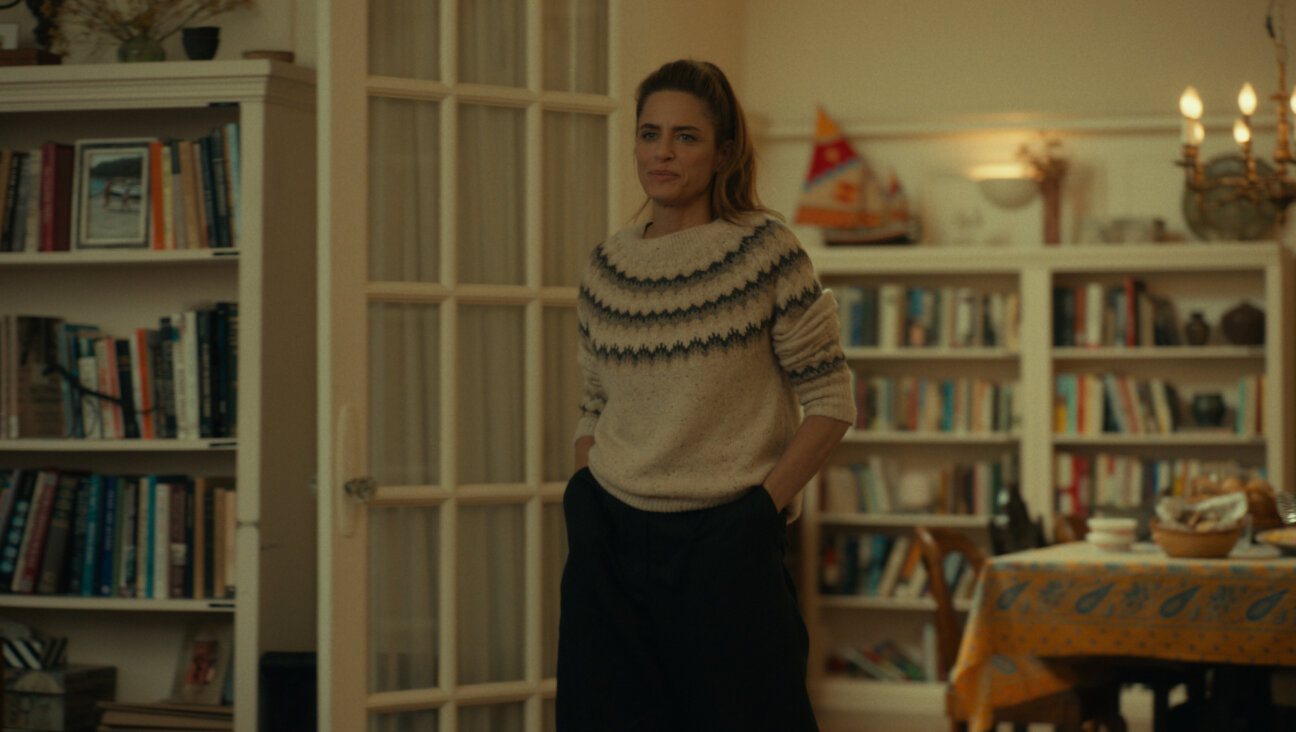Leaving the Worst of The Holocaust to the Imagination

Graphic by Angelie Zaslavsky
Clearly, playing biographical figures is challenging on many fronts, not least maintaining the delicate balance between authenticity and sensitivity. But for Isobel Pravda, who plays her grandmother, Holocaust survivor and actress Hana Pravda, she is in an advantageous position, not simply because she had a profoundly close relationship with Hana but because her lines are literally lifted from Hana’s diary. She can hear her voice and almost channel her.
Pravda has just completed a matinee performance Off-Broadway at DR2 of the Czech drama, “The Good and The True,” co-starring Saul Reichlin who plays Czech athlete Milos Dobry. Though the two characters never meet, their stunning strength of character and determination to forge ahead gives them common ground as the drama interweaves their recollections—in his case lifted from interviews—of life in occupied Czechoslovakia in the 1930s, the experience of incarceration in concentration camps, escape and survival. Still, the horrors are tempered to make it bearable for a contemporary audience.
“The play preserves the worst of the Holocaust for the imagination,” says Reichlin who joins Pravada in the now empty theater. “It’s a style and editorial decision.”
“The Good and The True,” which was written by Daniel Hrbek, Tomas Hrbek and Lucie Kolouchova, adapted into English by Brian Daniels, and directed by Czech director Daniel Hrbek, was originally produced in Prague’s leading repertory theater Svandovo Divadlo and has just completed tours in the United Kingdom and Belgium. It will continue at DR2 to run through Sept. 14.
Pravda has appeared in many British TV productions and in theater throughout England, while Reichlin is perhaps best known for his one man play, “Sholom Aleichem: Now You’re Talking!” which has been performed in the West End, in New York and throughout Europe.
The two British-based actors join The Forward’s Simi Horwitz for a discussion about the play, its resonance for contemporary audiences and the acting challenges inherent in the emotionally charged subject.
. FORWARD: Isobel, how did your grandmother’s experiences as a Holocaust survivor inform you performance?
PRAVDA: The Holocaust as a topic is just too huge. I can’t begin to know what she went through. But I can understand loss and she was a woman of my age. All I can do is think about how she felt in the moment and ask myself how would I feel?
REICHLIN: I don’t need to look for any motivation. The only motivation [of these characters] is to survive. You’re told to march, you march. It doesn’t matter what you think. You react to the circumstance and perform the experience. There’s nothing to embellish.
FORWARD: To what extent are you impersonating and/or interpreting your characters?
PRAVDA: I looked at archival material and footage, but I do not impersonate my grandmother. I try to capture her essence and hope her words come though.
REICHLIN: I never met Milos Dobry. I was planning to interview him, but he died a week before I arrived in Prague. However, I met his grandson and I learned certain facts of his life. He spoke five or six languages fluently. He excelled at whatever he did. He was ‘Think fast, act fast.’ I felt his personality and his grandson said he saw his grandfather in my performance.
FORWARD: What element of interpretation do you hope you brought to the role?
REICHLIN: Jewish survivor’s humor, which is a casting requirement. That humor is Messianic, hopeful. It’s Charlie Chaplin. If you can’t find humor in Auschwitz, you can’t find it anywhere.
PRAVDA: They were both able to make fun of their situations, which were very, very terrible.
REICHLIN: Isobel, do you ever ask yourself why Hana and Milos survived?
PRAVDA: All the time. That’s the driving source of the play. Of course, it’s luck and circumstance. I’m not going to say that people who didn’t survive lacked something. But I do feel there was some quality in Milos and Hana that made it possible for them not simply to survive, but flourish after the war: what enabled them to pick themselves up and carry on. For Hana it was work. It was through her work [as an actress] that she was able to live again and love again. The same was true for Milos with his passion for football and sports.
FORWARD: Does audience response vary with geography?
REICHLIN: Yes, there are cultural differences. In Czechoslovakia, audiences sit there absolutely silent.
FORWARD: Is it because of this material?
REICHLIN: No, they’re just respectful about theater.
PRAVDA: But there’s wild applause after the curtain.
REICHLIN: They don’t clap until they’re told to clap.
PRAVDA: In the main London Synagogue on Holocaust Memorial Day we got the most laughs. It was an incredible atmosphere.
REICHLIN: They saw the nuances of humor.
FORWARD: Will a Holocaust play attract many non-Jews?
REICHLIN: I don’t know if this play would have a large non-Jewish audience.
PRAVDA: I don’t think of this play as a Holocaust play. It’s about two human beings who survived. That’s what audiences will see.
REICHLIN: This is about two Jews who survived.
PRAVDA: It could be seen that way. But when we performed it in a provincial English town—first for school kids and then in the evening for their parents—the reaction was quite astounding. They didn’t have to be Jewish to respond do it.
REICHLIN: That’s also true when we did it in a Leeds prison for 50 prisoners. You knew you were talking to audiences who understood what it meant to be captive.
FORWARD: Any anti-Semitic flak?
REICHLIN: We’re not big enough to attract a bunch of Palestinians. But, coincidentally, the day we opened, there was a big pro-Palestinian demonstration in Union Square.
FORWARD: There are two other Off-Broadway plays dealing with real life Holocaust survivors: “The Pianist in Willesden Lane” and “Wiesenthal,” which will open shortly. Why now?
REICHLIN: It could be coincidence or it could just reflect an appetite for something we haven’t seen in awhile. Suddenly, you’ll have three Hamlets playing at once.
FORWARD: Isn’t there the danger that Jews — in addition to gentiles — will become over saturated with Holocaust plays?
REICHLIN: That’s not an issue for me because I rarely go to them. They give me depression and pain and others are exploitive and trivializing.
FORWARD: What would you like audiences to walk away with after seeing this play?
PRAVDA: To feel what my grandmother felt: that we have a tremendous capacity for kindness. But we also have the capacity for unbelievable cruelty. And we must be aware of what’s happening now.
FORWARD: Are you talking about Israeli treatment of Palestinians in Gaza?
PRAVDA: The Holocaust was on a unique scale and that shouldn’t be forgotten.
FORWARD: Some might say three Holocaust plays at this time serve as a defense or even a subtle justification for the ongoing war in Gaza.
REICHLIN: Nobody has to justify anything. There has never been anything, certainly not in modern times, to equal the grotesqueness and gratuitous cruelty of the Holocaust. I want audiences to remember the characters we play and those who didn’t make it.
FORWARD: Any contemporary resonance?
REICHLIN: You can extrapolate and interpret. But that’s not what the play is about.
Simi Horwitz is a frequent contributor to the Forward.
















